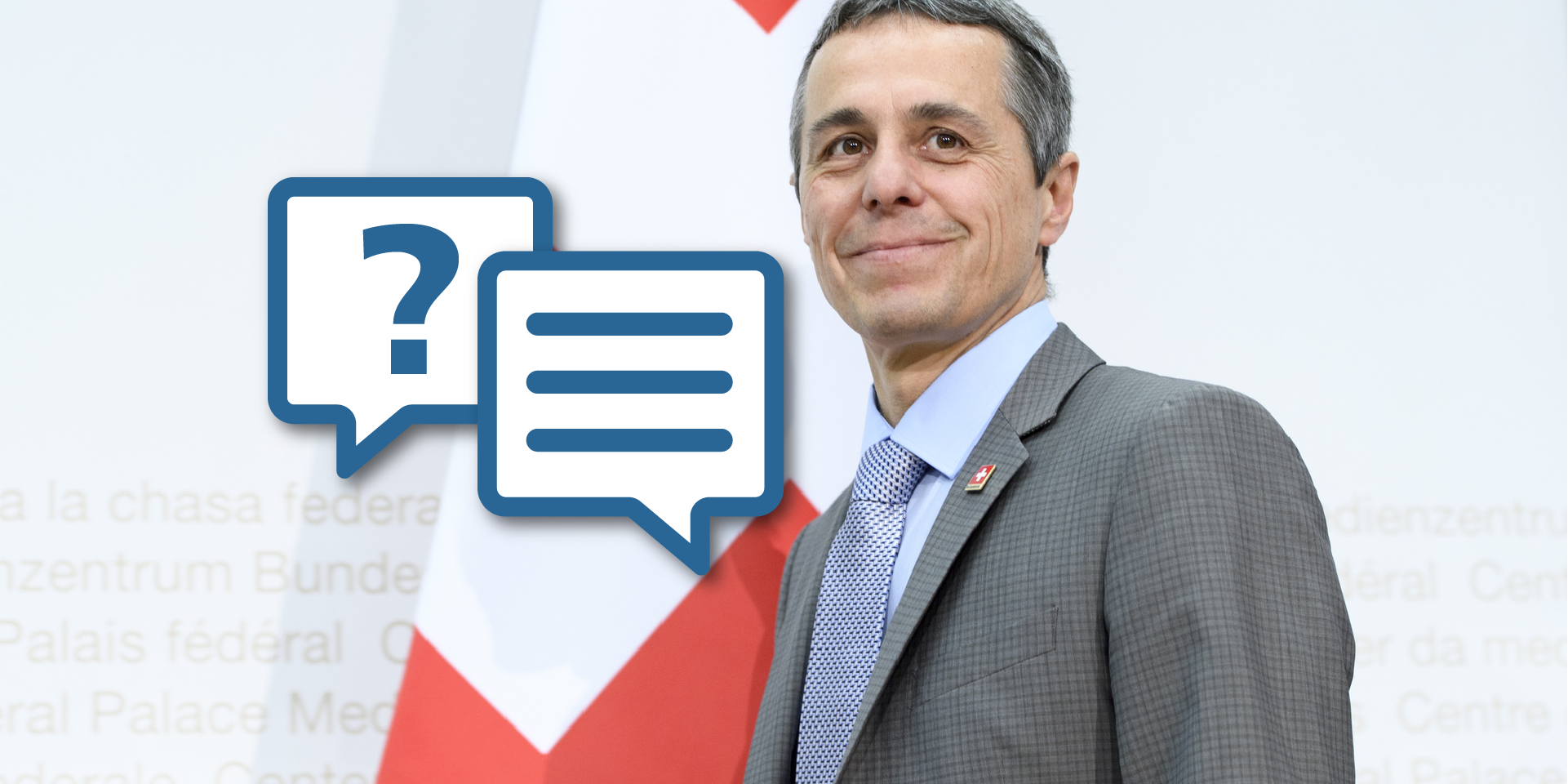"Foreign policy is an interests-driven policy, even among friends"
In an interview with Swiss television, Federal Councillor Ignazio Cassis, head of the Federal Department of Foreign Affairs, talks about Switzerland's special relationship with the rest of Europe and explains why he is not unduly concerned about the rising number of COVID-19 cases. In 'Gredig Direkt' Mr Cassis explains why he likes the various Swiss meanings of the word 'suboptimal' and why this word is a perfect illustration of Switzerland's cultural diversity.

Federal Councillor Ignazio Cassis speaks about Switzerland's relationship with Europe and explains why he is not unduly concerned about the rising number of COVID-19 cases. © FDFA
In just under a month the Swiss electorate will be voting in a referendum on the Popular initiative 'For moderate immigration (Limitation Initiative)'. This referendum will be a defining moment for the future relationship between Switzerland and the EU – a relationship between friends, albeit one where each side has its own interests. "Friends are important in life. But let's not romanticise relationships between states. Foreign policy is an interests-driven policy, even among friends." We will find a path forward if doing so is in the interests of both sides," stresses Mr Cassis.
Finding solutions requires a willingness to compromise and an understanding that all of us are shaped by our respective cultures. "Flexibility and an understanding of our history and our current circumstances are essential. Without a recognition of Switzerland's history we cannot find a path forward. Our 700-year-long history at the heart of Europe has made us who we are. This reality must be recognised. Our history is our identity.
Suboptimally good
Cultural and linguistic diversity is an integral part of the Swiss identity. As a federal councillor from the canton of Ticino, Ignazio Cassis also knows what it's like to be on the other side – as an outsider. "I am the only member of the Federal Council from Ticino, so culturally speaking I am essentially on my own. The fact that the people of Ticino are perfectly fluent in a national language goes largely unnoticed because Italian carries little weight." Mr Cassis communicates with his fellow federal councillors in fluent German or French. "These disparities come down to power relationships. Swiss Germans are in a position of power. They may have a great deal of sympathy and affection for other language regions, but embracing another culture takes more than that".
It's the small differences between the language regions that make Switzerland what it is. For Ignazio Cassis, language is just one aspect of Switzerland's diversity. Cultural differences are Switzerland's defining characteristic. It comes down to how we interact with one another, how we perceive our relationship with government authorities and politicians, and how we express ourselves. "I love the Swiss Germans' use of the word 'suboptimal'. When they say that something is 'suboptimal' they mean that something has gone disastrously wrong. They don't say that it went wrong. They say it's 'suboptimal'. When a French or Italian speaker refers to something as 'suboptimal' they mean that it's close to perfect. I take great pleasure in these nuances, which are an integral part of our country's cultural diversity."
Cautious optimism
There are also differences in how Switzerland's different regions are tackling COVID-19. As the number of cases has risen in the last few days, each canton has adopted its own set of measures. As far as Ignazio Cassis is concerned, there is nothing wrong with this. "Having different rules in different cantons is not necessarily a bad thing, as the epidemic is not the same across the country." When implementing measures, it's important to take account of the cultural differences between the German-speaking, French-speaking and Italian-speaking parts of Switzerland, notes Mr Cassis. "There are differences in behaviour from one canton to another, and we also have different understandings of the relationship between citizens and the state. The cantons are well aware of this, which is why they play such an important role in our federal system."
Mr Cassis is not concerned about the rising number of COVID-19 cases but stresses that the situation is being closely monitored. "The number of new infections is just one indicator. Two other important indicators are the number of COVID-19 patients currently in ICUs and the number of deaths. Both of these indicators are currently close to zero. This means that we are currently seeing the virus spreading among younger people, who tend to develop fewer symptoms. This is of course also a cause for concern. But we shouldn't dramatise what's happening. What we need to do is to implement the various measures consistently.
Candid criticism
The conversation also focused on current international developments. Switzerland is closely monitoring what has been happening in Belarus since the presidential election. Switzerland opened its first embassy in Minsk in February of this year. "With the opening of the Swiss embassy, we wanted to express our support for the positive direction the country was taking." In a telephone conversation with the Belarusian foreign minister, Vladimir Makei, Mr Cassis explained that Switzerland considered the outcome of the elections to be a step backwards. "I told him quite plainly that recent developments were a disappointment to us."
Asked about recent critical remarks he had made concerning the human rights situation in China, Mr Cassis pointed out that Switzerland had made its position clear on previous occasions, for example in relation to the human rights situation of the Uighurs and the situation in Hong Kong. The close ties between Switzerland and China, said Mr Cassis, enable Switzerland to speak candidly: "We want to continue to have a constructive relationship with China. But we must also address certain issues openly in direct dialogue", stressed Mr Cassis, who agreed with Chinese Foreign Minister Wang Yi that both countries intended to continue the human rights dialogue this year.
